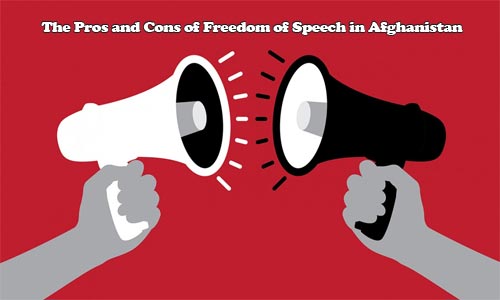With the emergence of relative democracy in the post-Taliban government, Afghans have been entitled to voice their opinion publicly. Everyone sought to raise their concern in spoken and written forms, especially on social media.
The media in Afghanistan, which resurfaced following years of standstill as a result of authoritative regimes, have played a highly constructive role since 2001 through monitoring the government and narrating the story of Afghan men and women to the world. Besides imparting information to the public, media also criticized officials openly.
The impartial role of many Afghan media in imparting information and narrating the positive and negative aspects of people’s life is outstanding. That is, Afghan reporters and journalists made the best use of the nascent democracy and freedom of speech.
The right to freedom of speech and print was advocated by Afghan government and preserved in Constitution as Article 34 says, “Freedom of expression shall be inviolable. Every Afghan shall have the right to express thoughts through speech, writing, illustrations as well as other means in accordance with provisions of this constitution.” It adds, “Every Afghan shall have the right, according to provisions of law, to print and publish on subjects without prior submission to state authorities.”
Similarly, Afghan Constitution recognized the Universal Declaration of Human Rights (UDHR) to further support democracy and the rights and freedoms, including freedom of speech, of the citizens. Hence, freedom of expression is also supported by UDHR which states in Article 19, “Everyone has the right to freedom of opinion and expression; this right includes freedom to hold opinions without interference and to seek, receive and impart information and ideas through any media and regardless of frontiers.”
However, freedom of speech has been challenged in one way or another. A number of officials misconducted journalists on several occasions. They hurt journalists physically with impunity. Worst of all, journalists came under attacks carried out by warring parties. That is, a number of journalists were intentionally targeted by militants, including the Taliban, for reporting the cruel acts of terrorist groups and revealing their flagrant violation of humanitarian law to the public. Last year, Afghanistan has been reportedly placed at the top of the list for the number of journalists and news media staff killed in work-related attacks. In the list, published by The International Federation of Journalists, Afghanistan was first with the death of 16 journalists, Mexico followed with 11, Yemen with nine and Syria with eight. Unexpectedly high on the list, the US, which is a strong democratic state, was in sixth place with the death of five journalists. Hence, despite the fact that Afghan Constitution advocates freedom of speech, insurgents deal strong blow to this freedom.
Nonetheless, Afghan journalists and media staff will not be deterred. They seek to continue their activities with strong determination but urge the government to ensure their security. Moreover, those who misconduct journalists and media staff have to be prosecuted regardless of their political position or social status since everyone is equal in the eye of law.
In terms of social media, freedom of speech has been exploited to a great extent since it is a free and open platform for every individual with unstructured communication. The bulk of online users in Afghanistan do not use this platform positively for many reasons. For the one, a number of individuals who have access to social media, mainly Facebook, lack very basic knowledge. They scroll up and down for many hours simply to entertain themselves, which is a waste of time. In case of commenting on a subject, they hold very partial position with banal literature, which is based on their own state of mind rather than knowledge or educational analysis. Individuals simply transcend the border of freedom of speech through using foul language, hate speech, and offensive rhetoric.
Similarly, a number of users ostensibly attack religious beliefs, cultural values and racial differences of the community, which is an open misuse of freedom of speech. In other words, the Afghan netizens do not consider the “harm principle”, proposed by John Stuart Mill in “On Liberty”, which suggests that “the only purpose for which power can be rightfully exercised over any member of a civilized community, against his will, is to prevent harm to others.” Or “offense principle”, which supports speech limitations, is ignored by social media users in the country.
Overall, freedom of speech is strongly supported by Constitution, but lack of law-enforcement and militancy are the two barriers before this freedom. Unstructured interaction and ignoring limitations of freedom of expression add to the challenges. Hence, the government must pay due attention to this issue through enforcing law so as to ensure freedom of speech for all citizens in general and for journalists and media staff in particular.
Home » Opinion » The Pros and Cons of Freedom of Speech in Afghanistan
The Pros and Cons of Freedom of Speech in Afghanistan
| Hujjatullah Zia

